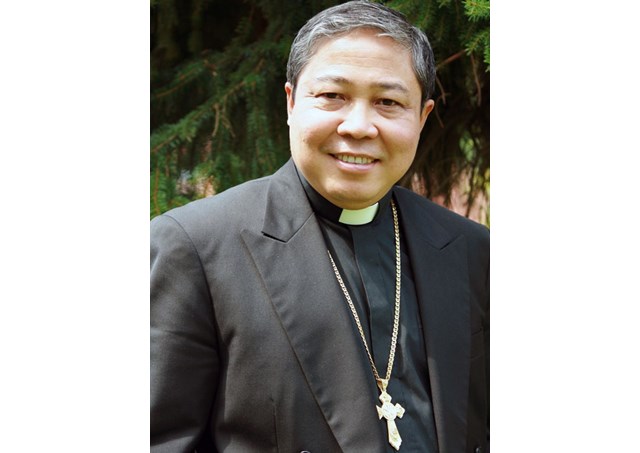
Holy See expresses concern about Israel-Palestine negotiations

(Vatican Radio)The Holy See on Tuesday expressed its deep concern at the “total lack of progress” of the negotiations between Palestine and Israel.
“As was recognized on that occasion, Israel has genuine and legitimate concerns for its security; however, such security will come not in isolation from its neighbors, but in being a part of them through a negotiated peace with the Palestinians through the implementation of the ‘Two-State Solution’, which has the support of the Holy See and of the international community in general,” said Archbishop Bernardito Auza, the Permanent Observer of the Holy See to the United Nations.
“The Holy See joins its voice once more with all people of peace to call for serious and concrete negotiations that will reinvigorate the peace process,” he said.
Archbishop Auza was speaking during a United Nations Security Council Open Debate on the Middle East.
The Archbishop also condemned - “in the strongest terms” - all attacks and abuses in the region based on ethnic, religious, racial or other grounds.
The full text of Archbishop Auza’s intervention is below
Intervention of H.E. Archbishop Bernardito Auza
Apostolic Nuncio and Permanent Observer of the Holy See to the UN
United Nations Security Council Open Debate on
“Middle East, including the Palestinian Question”
New York, 21 April 2015
Madam President,
My delegation wishes to express its profound appreciation for the decision of Jordan’s Presidency this month to hold this Open Debate on the “Middle East, including the Palestinian Question.”
The Holy See is deeply concerned at the total lack of progress of the negotiations between Palestine and Israel. It is difficult not to share the frustration expressed by the then UN Special Coordinator of the Middle East Peace Process, Mr. Robert Serry, during his last Security Council briefing on March 27 last.
As was recognized on that occasion, Israel has genuine and legitimate concerns for its security; however, such security will come not in isolation from its neighbors, but in being a part of them through a negotiated peace with the Palestinians through the implementation of the “Two-State Solution”, which has the support of the Holy See and of the international community in general. The Holy See joins its voice once more with all people of peace to call for serious and concrete negotiations that will reinvigorate the peace process.
The Holy See does not cease to encourage the leaders of Lebanon to resolve the impasse that has prevented the election of the President since May 2014, by putting aside narrow political interests for the sake of the greater good of a unified Lebanon. This institutional void makes the nation more vulnerable and fragile in the face of the overall situation in the Middle East. The international community must support Lebanon in every way to reacquire institutional normalcy and stability. It must also help it care for the huge number of refugees in its territory, which has created a situation that carries the danger of extremist infiltrations among the hapless refugees.
The conflict in Syria, as Baroness Valerie Amos defined it in her Security Council briefing last March 26, has reached “breathtaking levels of savagery.” The indiscriminate destruction of basic infrastructure, such as water and electricity facilities, hospitals and schools worsens the plight of civilians each passing day. The fall of Idlib, just 37 miles southwest of Aleppo, has sown panic among Aleppo’s population of more than a million people. The ethnic and religious minority groups are particularly anguished. The Holy See calls on the international community to prevent the enormous humanitarian disaster that a siege on and battle over Aleppo will surely provoke. We must do all we can to prevent yet another gross violation of international humanitarian law and of fundamental human rights.
The Holy See reiterates its condemnation in the strongest terms of all attacks and abuses based on ethnic, religious, racial or other grounds. It wishes to remind once again that the disappearance of ethnic and religious minority groups from the Middle East would not only be a religious tragedy, but a loss of a rich patrimony that has contributed so much to the societies to which they belong. That these groups are threatened with extinction causes unfathomable anguish and pain.
Last month in Geneva, before the UN Human Rights Council, 65 countries signed a Statement supporting the human rights of Christians and other communities, particularly in the Middle East. That Statement calls attention to the fact that the instability and conflict in the Middle East seriously threatens the very existence of many religious communities, especially the Christians. It calls on all States to join together and address this alarming situation.
Madam President,
When we call to mind those who have already lost their lives or those who have already been driven out of their homes and even out of their own countries, any action would already be coming too late. But from now on every action to spare even just one person from persecution and from all forms of atrocities is not only timely but urgent.
Pope Francis calls on the international community “not [to] remain mute and inert before such an unacceptable crime” and “not turn a blind eye to this.”1 To watch in complicit silence the horrors of our fellow human beings persecuted, exiled, killed, burned, and beheaded, solely because they hold a different religious creed or they happen to belong to a minority group, can never be an option.
Thank you, Madam President
| All the contents on this site are copyrighted ©. |


